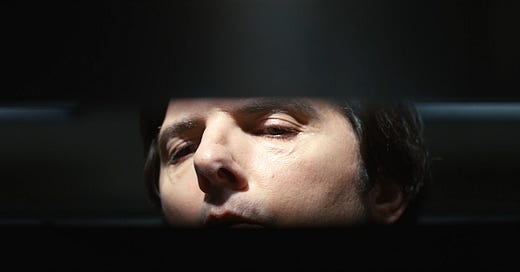A Tale of Two Severances
Spoilers for season one! But don't spoil me on season two. I haven't started yet.
Like most white people in America over the past week, I’ve been watching Severance. But not season two, because I didn’t have Apple TV+ until a few weeks ago. Instead, I’ve been catching up on season one, most of which I watched yesterday and finished last night.
Severance is a lot of fun. It has a great cast and likable characters, a wacky premise and a genuinely weird tone, and the central mystery is compelling.
However, because the show is so built around the allure of the mystery of what’s going on at Lumon, I wanted to take note of a few ideas that I think are implicit in the show and how these ideas are conveyed dramatically. I'm also interested in tracking how these ideas evolve when I start watching season two, and it might be fun for readers who have already watched season two to think about this in retrospect.
One of the fun tricks of Severance is that it’s two shows: one about Mark in real life, and one about the “severed” Mark at his day job. Let’s start with the show about Mark in real life.
Severance as numbing device
The non-severed plot of the show follows Mark, a man who lost his wife a few years ago and decided to get a severed job to “deal” with the loss. But, as the show makes clear, this is a mal-adapted coping mechanism, a numbing device that allows him to not be alive half of the day.
This is a pretty rock-solid storytelling idea. Work is often used to numb trauma and the issues we haven’t sorted out that we aren’t ready to confront. I’ve certainly done that.
We don’t see the lives of the other severed workers very intimately during the first season, but it certainly seems like Irv is working out some trauma from when he was a veteran, which he seems to also be dealing with by listening to metal and making abstract art. Dylan’s life is the most opaque, and Helly probably has some stuff she’s dealing with from being an Eagen, but this is also not very explored in season one. Although, we’re also given a pretty straightforward, non-trauma-related reason for her choice to be a severed employee, in that she’s using it as a propaganda mechanism for her family. I think this is interesting for a point I’ll touch on later, but I also doubt that anyone who would willingly undergo this procedure is fully right in the head, so I imagine the show will more fully explore Helena Eagen’s side of this in season two.
The severance procedure is set up as an easy way out for the damaged among us, in the same way that being an alcoholic or having more socially accepted addictions like workaholism or being on your phone all the time, are also ways to numb yourself.
The numbing device angle of Severance is the most “timely” and “relevant” of the show’s many ideas, and it’s the easiest to pick up on.
It is also not that directly explored. The plot of this show is that real-life Mark is trying to suppress his emotions about his dead wife, but when a former coworker, Petey, shows up and tells him of the evils of Lumon, and then promptly dies, Mark begins to investigate what exactly is going on at this shady company.
Along the way, he goes on dates with his sister’s friend, Petey dies, and he meets the woman who performed the severance procedure on him, who is now trying to lead some sort of resistance. He gets into a fight with the girl he’s seeing, rips up a picture of his dead wife, and realizes he’s been numbing the pain rather than truly grieving. At the end of the show, he decides to quit his job (before the plot gets in the way). That’s where we leave real-life Mark at the end of the season.
It strikes me that Mark’s real life is just not all that well-rendered in the show. I felt myself looking forward more to the advances in the plot in this storyline, which were more connected to Lumon and the other half of the show than I was to Mark’s inner journey.
Perhaps this is what the show wants—maybe his mission to uncover the secrets of Lumon is just another way to not deal with his wife’s passing (who, it seems is not dead, which will probably end up being another wrench thrown into this).
The show hasn’t really leaned into what it means to lose someone yet, which is fine, because this is a multi-season long epic, supposedly. But, at the end of the season, it almost seems like Mark has resolved his trauma. And, I guess all it took was taking some time to remember her?
To compare to another piece of recent media about work-trauma interaction, this doesn’t work as well as a movie like Mickey 17, for example, which I also had problems with but basically works on this level. In that film, Mickey has fairly well-rendered reasons for why he submits himself to an awful job. He feels like he deserves to be unhappy because of the guilt he carries from his mother’s death as a child.
Severance doesn’t really bother with those kinds of character questions. For instance, does Mark feel guilty about Gemma’s death? Why is he stalling himself in this way? Does he feel like he deserves to be stalled in some way? Was he actually always like this, even before Gemma’s passing?
Severance wants to play in the mystery box, but because of that, it makes one of its central storylines fairly inert once you move past the thrum of plot-plot-plot beats. Severance can’t really explore Gemma’s death and how it makes Mark feel because it would interfere with the major twist that she’s still alive. That’s a valid storytelling choice in some sense, but it feels like the show could have time to go deeper, even a bit.
It makes me wonder about this half of the show in the future, because it just does not seem all that interested in really cutting to the “why?” of Mark’s character. Which is actually quite interesting, because the other half of the show is nothing but “why?”
Severance as a blank slate
On the other side of this show, where it spends much more of its time, is a much trickier, less “trendy” or directly relevant, but in my view, much more interesting question: what if we put a bunch of adults with the minds of babies into an office building and never let them leave?
I mean, I think they’d probably have a lot of sex, but Severance is one of the least horny shows I’ve seen in a long time, so it doesn’t take that route (although, it seems like it kind of wants to sometimes?)
In this bubble universe, these adult babies are told to work forever. Their entire experience is shaped by this job. They are told there is an outside world, but they know nothing concrete about it. All there is is the work and the people in the office.
Basically, it’s Plato’s allegory of the cave, but they know there is an outside world. This begs a bunch of super interesting plot/motivation questions, which the show uses as its mystery.
What I find so compelling about this piece is that every character is a blank slate. In the case of Helly, we literally see her entire “life” unfold in the show. Because of that, the show has to make some direct claims about what it means to be alive right at the start.
The only outside feedback that the innies have is their work. Their “value,“ from the moment they’re born, is on how much they can get done. They are trained to suppress curiosity and wants. Their worth, entirely, is based on what they mean to other people.
Each character of the main four, except for Helly, accepts this premise. They are seemingly happy to do what they’re told, although Mark has some doubts after Petey’s disappearance.
Helly is the only one who persistently rebels. She’s also seemingly the only one of the main four who’s outtie isn’t using the job as a way to numb themselves. We can make a light conclusion that the same traits that cause someone to choose to numb themselves on the outside world are the same traits that cause them to be more compliant as a severed employee.
The innies, with the exception of Helly, are only able to imagine themselves as subservient to others. This is the same reason why they numb themselves in the outside world and choose to be severed. They (inside and outside) do not believe they have the right to control their lives. But, they learn it on the inside. Helly teaches them how to have agency.
Which does make you want to ask: if you were told to work for your whole life without really knowing why, would you?
Severance presupposes that all of us have a need to explore, to learn, to grow on our own terms. “Purpose” as derived from others is no purpose at all. On the inside of Lumon, the innies start trapped, but are slowly finding a way to live their own lives, the same lesson that Mark needs to learn on the outside.
I think this part of the show is really resonant, and works significantly better than the other half of the show.
It’s also a lot simpler. The outside world of Severance is obfuscated by a plot and twists and turns that threaten to drag the show down if it’s not careful. The show inside Lumon provides very clear stakes and a clear central metaphor for the audience to latch onto.
The inside of Lumon, despite having the mystery to latch onto, is fairly character-oriented. We know what innie Mark, Helly, Irv, and Dylan want from the get-go, and the drama comes from seeing them bounce off of each other. We know why they feel the ways they do in each case, and see them evolve. In some ways, we know everything there is to know about them. The excitement inside Lumon is from “What are these characters going to do next?” The excitement outside Lumon is from “What will I learn next?”
Severance only likes itself at work, too
One more linguistic thought: by using the terms “innie” and “outtie,” Severance correlates an “inner life” with a work life and an “outer life” as your actual life. “Inner” typically connotating deep and meaningful, “outer” as superficial. The language that Lumon puts on its employees is literally telling them (and by extension, the audience) how to think about and organize their lives: work as deep, outer as meaningless.
Severance’s storytelling structure mirrors this organization of thought. The show’s outside life is also more shallow than its inner life. The innies are the ones finding their purpose, undergoing a transformational experience, while the outties mostly wallow. And all of this happens at work.
So, is this a show about how work divides you and numbs you, or how work is a simulacrum of the experience of being alive to the point that it ends up being more meaningful than the story of your actual life? What if what Lumon is actually doing is to us, the audience, setting up a system where we are more invested in the work lives of these people than their real lives? Is the show again telling us to look in the mirror, that we’re looking for meaning in the work part of the show when we should be trying to find it in the outside part of the show?
That’s another trick Severance pulls: the experience of watching it makes you look at the work, not at the lives. It wants us to feel that what is going on inside Lumon is more compelling than outside Lumon. You’re a lot more interested by what’s going on at Lumon than in Mark’s life, right? Boring! Snoozetown! Get back to the Irv/Burt romance! All of Severance’s roads lead back to work.
It may be that Severance has a tension in its soul as a piece of art. Is it an anti-work culture show, or is it also only able to see itself as good when it’s at work? Is that a criticism of the series, or is the show just holding up a mirror to what we want to see?
Or, will it synthesize these ideas into something bigger? Time will tell!
That’s cool. But what do you think’s going on?
I’m not really a theory/prediction guy, but if I had to guess, Lumon is probably using the severance program as some sort of pilot/test program for a new society or religion they’re trying to build, and each “floor” is a new experiment they’re running. After all, why would they give the information that there is an outside world to begin with? Seems fishy. I’m writing this down for posterity in case I’m right later.
Anyway, signing off. Here are some photos from Colorado:


Song of The Week: One of Us Must Know (Sooner or Later) by Bob Dylan
But sooner or later, one of us must know that you just did what you’re supposed to.
Sooner or later, one of us must know, that I really did try to get close to you.





